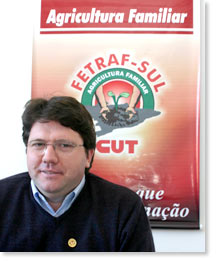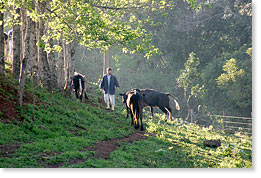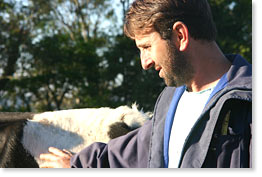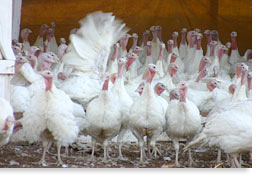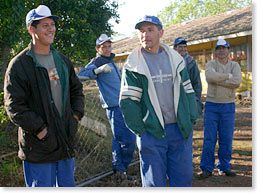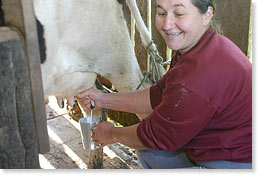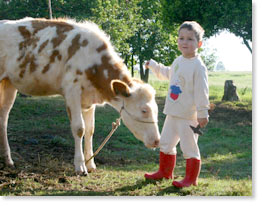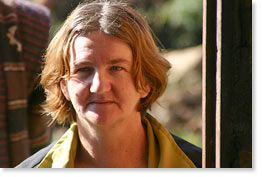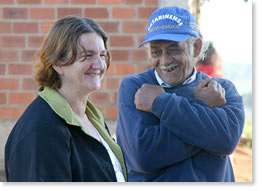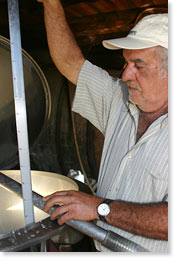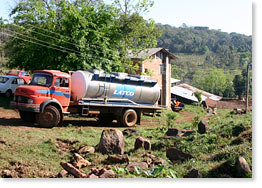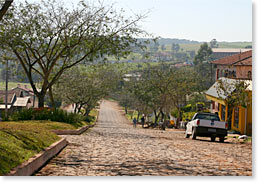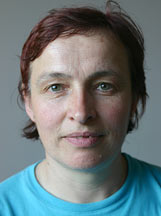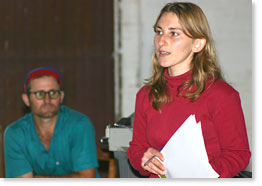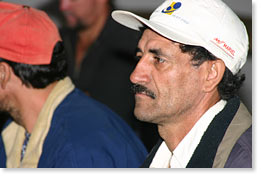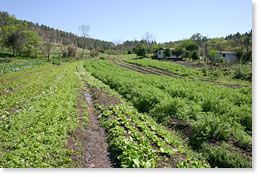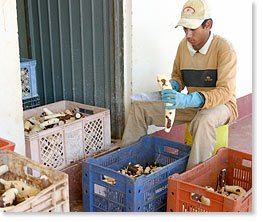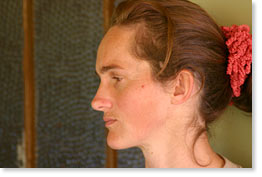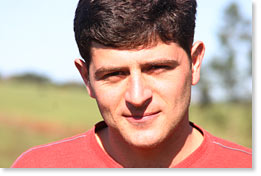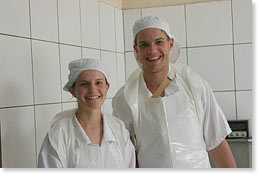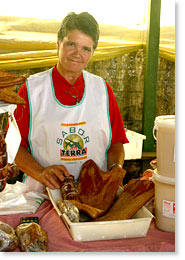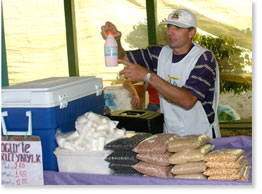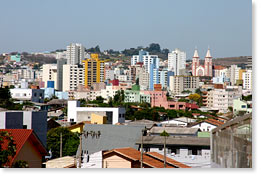|
Interview with Altemir Tortelli
General Coordinator of FETRAF-SUL "When Cooperative Structures Are The Instrument" and Autonomy Chapecó, Santa Catarina, Brazil
Through its organizing, FETRAF-SUL has developed networks of economically autonomous farmers (union and non-union) building on-the-farm agro-industries. Some of these agro-industries are owned by one family; others are owned by cooperatives of three, four, or five farm families. The farmers add value to their farm products with the agro-industries, taking the transformed products all the way to market. As a union, FETRAF has negotiated with the government for credit, housing, and education. (Click here to read an interview with Severine Macedo, youth represenative on the board of FETRAF-SUL.) This interview with Altemir Tortelli was conducted on August 29, 2004 in Chapecó, Santa Catarina, Brazil, and later edited, by Nic Paget-Clarke for In Motion Magazine with simultaneous translation by Agnes Vercauteren, officer for international relations of FETRAF-SUL.
In Motion Magazine: At what point did FETRAF decide it was important to build an alternative economic structure? What happened in the lives of the people that they decided that they were going to have to make a change like that? Altemir Tortelli: When you don't have your own economic system, you always will support the great corporations. For example, when there was a lot of subsidized credit here in the region with the Green Revolution, those credit programs came to benefit the corporations. If we don't have our own independent system we always will be working and giving the money to the large corporations. But, first of all some points: it is clear that a large group of the family farmers haven't joined, don't have this vision that they need to construct an independent economic system. They are still integrated in the agro-industry business. They are dependent on the agro-industry. They are producing for the agro-industry. Another fact is that here in Brazil the (large) cooperatives built up in the '70s, with the Green Revolution, they have the same logic as the agro-industrial corporations. They integrate. They make their members dependent on them. It is the same system as the agro-industry, and they are acting here within the south, within the family agriculture. Lastly, the state policy, the state infrastructure, it is giving support to our structure, our cooperative structure, on the one side, and the traditional cooperatives on the other side. They are not opposing the alternative economic structure. That is another fact. You have technical support; you have surveys, all from the state. This public service is there. But they have the vision of the traditional model that agriculture is in the hands of the large companies and the large cooperatives. Independent economic organizations So, when we started with the trade union organization, when we organized ourselves into independent organizations, we got political conscientization. When we started negotiating with the government, we realized at that moment that the only manner to reach our aims was to have also an independent economic organization. The large companies control the state, the legislators, and the large cooperatives in Brazil. And we saw in other countries, even with more democratic governments, they didn't change much because today the force of the large cooperatives is very, very great. If we cannot construct within society an economic capacity we will not get any change. In the hands of the family farmers Another reason (for an alternate structure) was that we perceived that the price the producer gets for his products and the price the consumer pays, there was a large difference between them. And this difference, it was mostly in the hands of the large cooperatives. We started implementing an autonomous economic system to make the whole process from production to the consumer, to make this process stay in the hands of the family farmers. A few years ago, when we were negotiating with the government we defended only ideas. Not only with the government but also with the society -- we defended ideas, theories, policies, but we couldn't prove in practice what was possible. Now, when we are negotiating, we are proving our ideas with an alternative system: an educational system, an alternative credit cooperative system, a housing cooperative system, an agro-industrial system. Now, we are speaking about practice. Now, we are demonstrating that it is possible. Not to sell the raw materials but to sell a transformed product In Motion Magazine: What are the elements of your autonomous system? Altemir Tortelli: One of the differences in principle (between our system and theirs) is that we want to decentralize the whole structure. Not to centralize in one or two large structures, but to be decentralized and close to the farmers. To aggregate value here where the families are living. Not to sell the raw materials but to sell a transformed product. To transform it in agro-industries. Small agro-industries. To guarantee an income from the farms. Lower the costs; enlarge the profits It is not our aim to reach an enormous productivity to get the profit for the farmer. We are making a large effort to adapt the production systems to lower the costs and to enlarge the profits. For example, in milk production, with cows, this is large production but you need to buy expensive feed for them, so the result is very small. We work with the cows for smaller production. You give what you have on the farm. You don't need to buy the feed outside the property, the farm. That is why small farmers are joining and starting milk production for the market, not only for the family but also for the market. A special relationship with nature Another point is that family farmers have a special relationship with nature and with the community and this value is very important also. The way of life of family farmers not only produces raw materials, it produces a social way of life with values for the society that is very important. We are working for the valorization of this profession. It is important for society. Until now, to be a small farmer was very pejorative here in Brazilian society. They had no value. It was marginalized. We are working especially with the youth with this very important way of life. In Motion Magazine: And do the youth believe it? Altemir Tortelli: Especially with educational programs, we are inverting the situation. Especially with educational programs related to concrete initiatives where the youth can be in the main role, not just the father and the mother, their parents. They can be the administrators of a local agro-industrial initiative. That is what stimulates the youth to stay in the countryside. We won't go back to the colonial situation where we were producing for subsistence. We want to develop a system in which the farmers have control. Especially, taking control of the production all the way to the consumers -- with a small cooperative structure, close to the families, close to the communities, where these cooperative structures are the instrument to make the process of industrialization and also to make the process of commercialization (going to market). The control must be in the hands of the farmers for this whole process. In Motion Magazine: What are the different departments of FETRAF? Altemir Tortelli: Our structure is not finished. We are implementing proposals. However, we have managed to organize with the federal government a special program for credit for family agriculture called PRONAF (National Program for Family Agriculture). Agnes Vercauteren: It is a very good program. Seven billion reais for this year. Rent is subsidized and it is only for family farmers. Small farmers are more subsidized than larger farmers. It started very small, about ten years ago, and last year it was enlarged. It involves credit for one harvest, to plant and harvest one crop. But also for investments to manage these credits. FETRAF organized about 80 credit cooperatives here in the south. These cooperatives have 20,000 farmer members at this moment. Not only the farmer members of FETRAF are members of the credit cooperatives. Altemir Tortelli: Another sector is education capacity building, where we have implemented a program that is still going on -- Terra Solidaria. In the past three years we have trained and given scholarships to farmers -- 5,000 farm youths and older people. Also, we discussed the policy with the government as they have a policy to use the scholarship programs in the countryside. At the same time we were negotiating with the government about the policy, we were implementing a program with our own people, technical people, and educational people linked to FETRAF so now, it is financed by the federal government, yet FETRAF has the autonomy to implement our pedagogic and political program for capacity building. In Motion Magazine: Is that because of the Lula (President Luis Ignacio da Silva) government? Altemir Tortelli: It existed before Lula. We have several cooperative structures. The structure of the credit cooperative is we have the central, the south, and two autonomous structures from Santa Catarina, Rio Grande and Paraná. There's a structure in the region, the micro-region, the state, and the local structure. These are the production cooperatives. One of the best-organized sectors is milk. We have three independent structures. One is the CORLAC (Cooperativa Rio Grandense de Laticínios e Correlatos) structure in Rio Grande do Sul; there's another in Santa Catarina; and another in Paraná. We are bringing them together. Here in Rio Grande do Sul, they started from the central structure to the local. There in Paraná and Santa Catarina, they have the local structure and now they are centralizing. Our cooperative house construction program started in Rio Grande do Sul and then we organized Santa Catarina and Paraná. Together with trade unions we are organizing them in the regions. Another structure we are now building, discussing is the cooperative for technical assistance. And in education, we are developing a methodology named farmer-to-farmer. This is held part in the schools, part in the communities. Part is the official education program, so the students get their secondary diploma. Lastly, we are developing the agro-industrial family structures. In some cases, one family has a little industry; in others, two, three, four, five families together are as one small industry. In Motion Magazine: What kind of industries? Altemir Tortelli: Production of cheese from milk, for example. Also they transform meat, sugar cane, fruit. In Motion Magazine: So they run these industries on the farm? Agnes Vercauteren: Yes, two, three farmers together. In Motion Magazine: They add value to it on the farm? They don't give it to someone else, so they make more money that way? Agnes Vercauteren: Yes. In Motion Magazine: And the families are becoming wealthier? Altemir Tortelli: It's on this point that a lot of youth are staying on the farm. I hope you will see a lot of these experiences. For seven years we have been constructing this, and now a new program has been negotiated with the government to finance these kinds of initiatives. These little industries together they organize themselves in a small cooperative. And, on the municipality level, or on the regional level, together with other family cooperatives they make a system, like this here in Santa Catarina, which is named Union for the Cooperatives of Family Agriculture (UCAF). This exists. This has labels. Markets. Winning a dispute with ParmalatIn Motion Magazine: What percentage of overall production is done in this independent manner? Including the corporations. Altemir Tortelli: As an example, the milk cooperatives have existed about ten years. In Rio Grande do Sul, they have control of 12-13% of milk production. And their opposition was Parmalat (an Italy-based dairy corporation). When Parmalat entered Rio Grande do Sul, in Brazil, not so long ago, they allied with a major cooperative in Rio Grande. There was a dispute. Which farmer was member of this or member of that. The FETRAF cooperative has more than 2,500 members and the one allied to Parmalat has 2,000. Our system has existed for ten years and theirs 60 years. The consequence of this all was that Parmalat had to pay ten cents more per liter of milk than in the region where our cooperative system doesn't exist. They forced the level of the milk price up. In Motion Magazine: For everybody? Agnes Vercauteren: For everybody. If Parmalat doesn't pay their members, the members will go to the FETRAF cooperative. Altemir Tortelli: But if your earlier question is, is this structure consolidated -- my answer is, "No". What happens happens because the trade union structure is strong. That is what is giving it support at the base of this economic structure. We have done the process of conscientization of the family farmers, that they have to construct their own cooperative system. But, though we have done great battles to win the government policies, to support these kinds of structures, from the 7 billion real for the credit program PRONAF, that the government is directing to family agriculture, only 150 million reais will be going to the cooperative credit system. The rest goes to offshore banks, Banco de Brasil, or goes to the (large corporate) cooperatives. The 7 billion of credit for PRONAF is disposed of in three ways. First, to the cooperative credit system that exists here in the south, and also in other regions. Second, to the large cooperatives although some family farmers can use the credit. And the third way is to the corporations, large corporations like Sadia and Souza Cruz, a part of Philip Morris. Agnes Vercauteren: They take some of the money and pass it to the small farmers who have a contract with them to produce tobacco, for example. Two views of the unionIn Motion Magazine: How do you recruit people to join? Altemir Tortelli: In the '60s, before the military dictatorship, the trade union was started with the organization of the farms by the church. But they started it because they wanted to organize the people against communism -- because another force acting in the countryside was the communist party. At that time, the organization of the trade union was to give assistance to the workers and to the farmers -- dentists, medical assistance, all kinds of assistance. And there are still a lot of farmers who go to the trade union to get these services. But there are others -- and this is more the consequence of the campaigns and the movement FETRAF-CUT has built up, as well as the liberation theology sector of the church - there are others who see the trade union as an instrument to struggle, to get your rights, to organize yourself; that it is something to defend your position. So, there are still in the countryside two kinds of people. One, those who go to the trade union to get benefits and the other, those who join to make a strong organization -- to struggle, to negotiate with the government. These people who still see the trade union as an organization, an appendix of the government, to give assistance -- we have to do a lot of work to open their minds to see that our organization is something different. To show in practice to the farmers that only when you are organized and you are participating, and organized in cooperatives, that you have a future on the farms. Ligas Camponesas, Liberation Theology In Motion Magazine: What happened to the communists? Altemir Tortelli: They had the Ligas Camponesas. This was a rural movement in the northeast of Brazil. And they had some communities here in the south. It was in these cells that the real trade union movement was started. But they were decimated by the military dictatorship. They were killed, expatriated. The state, with this assistance program, and the church, with this anti-communism program, they joined forces and they organized the official trade union organization in the countryside. In Motion Magazine: And you are developing a different system from that? Agnes Vercauteren: Yes. Altemir Tortelli: From the same Catholic Church, with the theology of liberation, there was a group who started to organize the real and the new vision of the trade union movement. That's the trade union movement of the CUT (Confederation of Trade Unions). In Motion Magazine: The liberation theology adherents worked with the communists to form the new trade union? Altemir Tortelli: No. The liberation theology was the largest movement. And the communist party joined. In Motion Magazine: How do people learn to join today? Altemir Tortelli: One thing we are doing is to intensify the formation of the local leadership on the basic level. We are doing a process of capacity building of these leaders. Secondly, we are doing conscientizational work in the communities with the families. We are inviting. We are talking with the people. Each year we are taking two to three months to make a large movement, to mobilize the communities where all the people are involved in the same objective -- to talk about agriculture, about the future of agriculture, about the necessity to organize themselves. And thirdly, (people join) when we win something, when we achieve a concrete gain for the farmer. For example, last year there was a large period of drought for two, three months, and FETRAF in the three southern states negotiated with the government, did battles. We set up some points on the highways that no one could pass -- to negotiate with the federal government for some compensation for this dry period because the people hadn't had a harvest. And there were some benefits. It was not all we negotiated for but there were benefits. So, with radio programs the local trade unions they made it public that FETRAF got these benefits for all the farmers, and not only the farmers who are members of FETRAF. People became aware of the fact that by organizing themselves, making FETRAF stronger, it's possible to have benefits for the family farms. That's what happened this year. And then they join. In Motion Magazine: Is the membership growing? Altemir Tortelli: Acting in these three forms to reach the people, our number of members is increasing, but there is a problem that not all the members are contributing financially all the time. You have times when they are contributing well and then because of some economic crisis it is decreasing. We are looking for some mechanism to regularize, to stabilize this movement. A new trade union/cooperative structure The discussion we are having on the (FETRAF-SUL) board is the relationship between the trade union structure and the cooperative structures. How to consolidate this as a whole organizational structure of the family farmers. Today, each of these cooperatives is autonomous. They are not all within the trade union structure. That's a problem. In Motion Magazine: It's a problem? Why? Altemir Tortelli: It is a problem, but it is not. The commercial and financial actions are not the main function of the trade union so it's good to have the independent structure. But it is our opinion that these economic structures cannot do only economic movements. They also have to have a political function, to have a political proposal, and sometimes our friends, here, colleagues, they like to limit their action to the economic implementation of that proposal and nothing else. So how are you to integrate the economic and political? It is a new experience we want to construct. But the trade union structure of family agriculture, it doesn't exist so much. Mostly family agriculture is organized in movements, all over the world. Not in trade unions. Also, there are new experiences in other countries and they discuss family agriculture in Brazil. How to integrate a union structure with these cooperative structures. Maybe to design another organization to integrate all of this. It is important that you know that this structure has an administrative, financially independent system but politically they are the same as FETRAF, and the board of these structures is part of FETRAF also. But they are not dependent on FETRAF. In Motion Magazine: Everyone is democratically elected? Altemir Tortelli: Yes. The elections of FETRAF are done by direct vote. It is not a delegated vote. It is a direct vote process from the farmers. Every member one vote. GMOs: a strategic and economic error In Motion Magazine: What is the opinion of FETRAF of genetically modified crops? Altemir Tortelli: We are part of a national movement in Brazil that is against genetically-modified crops. Together, we have had some movements to influence the government and the national Congress. Our opinion is that for the development of Brazil, the Brazilian economy, we don't need the transgenic crops. The numbers have shown this. It's an error, a strategic and economic error, for Brazil to allow GMO soy, Roundup Ready soy. GMOs take all the opportunity -- the farmers have their seeds in an autonomous way -- and it concentrates a lot of power and control in the hands of, for example with soy, one large corporation -- Monsanto. Another reason is it is not proved that these GMO products don't cause effects on the health situation of the people. Trade policies: social not commercial In Motion Magazine: If much of what is produced by the family farmers actually goes to feed the local population, how important is it to you what the trade policies are? Altemir Tortelli: It is very important for us that the policies that support family agriculture, like PRONAF, are not influenced by these negotiations. That these policies can be preserved, as the United States and Europe preserve the subsidies to their farmers. These policies cannot be based on a commercial strategy, but on the right to protect family farms and guarantee food sovereignty here. We are exporting a lot of agricultural commodities but we are also importing a lot of food products, and they are competing with the locally produced products. In Motion Magazine: When I talk to the U.S. family farmers, what they produce doesn't get exported by them, it gets exported by, for example, the seed companies who they sell to -- at the prices that the seed companies tell them that they have to sell to them. Altemir Tortelli: It is the same thing here in Brazil. For example, soy, more than 30% of the soy is produced by 100,000 family farmers from the south of Brazil. 98% of this soy is commercialized. They have to sell it to the large corporations and only some little cooperatives are selling this soy directly to other small companies in Europe, or cooperatives in Europe. International family farmer contacts In Motion Magazine: And how do you see the future? Altemir Tortelli: I have a lot of hope. I am seeing that people all over the world are convinced that the battles, the struggles, the mobilization has to be done at a world level. Not only capital has to move on a world level, but also social mobilization. In the last few years, the international contact within the rural sector, within the family farming sector, has increased very fast. I believe that it will be possible for movements of family farmers to influence international decisions. Everyday, more decisions, national decisions are influenced by international decisions. I think it will be possible to show society that there are different ways of thinking, that there are different projects, and the family farmers will be able to make these projects visible for society. Land reform and family agriculture In Brazil, we know that the government of Lula is a government composed of different political forces. We know that Lula has made an alliance with big farmers. We know that. But we never have had such a large space and also such access to information and to dialogue with the government, as now. Land reform and family agriculture are among the daily subjects from the government and we hope that we can also make them daily subjects for society. The possibility for more democracy, for more participation, has made a movement of evolution. There is being created a lot of social movement for cooperatives. For example, PRONAF, last year, 50% of PRONAF was for the south and now, because people in other regions of Brazil have organized themselves, influenced by the social movements but also influenced by the national government policy, only 20% is coming to the south, the other is going to other regions. There is so much opportunity at this moment in Brazil to go further with social organization. It is the first time in history. So, FETRAF, which is a very new organization (we are planning the formal organization on the national level for September 2005), has the possibility to make the structure by ourselves. People are coming from other places in Brazil to join the FETRAF idea. It's new and brings hope. Published in In Motion Magazine April 24, 2005 Also see:
|
||||||||||||||||||||||||||||||||||||||||||||||||||||
If you have any thoughts on this or would like to contribute to an ongoing discussion in the  What is New? || Affirmative Action || Art Changes || Autonomy: Chiapas - California || Community Images || Education Rights || E-mail, Opinions and Discussion || En español || Essays from Ireland || Global Eyes || Healthcare || Human Rights/Civil Rights || Piri Thomas || Photo of the Week || QA: Interviews || Region || Rural America || Search || Donate || To be notified of new articles || Survey || In Motion Magazine's Store || In Motion Magazine Staff || In Unity Book of Photos || Links Around The World NPC Productions Copyright © 1995-2018 NPC Productions as a compilation. All Rights Reserved. |


